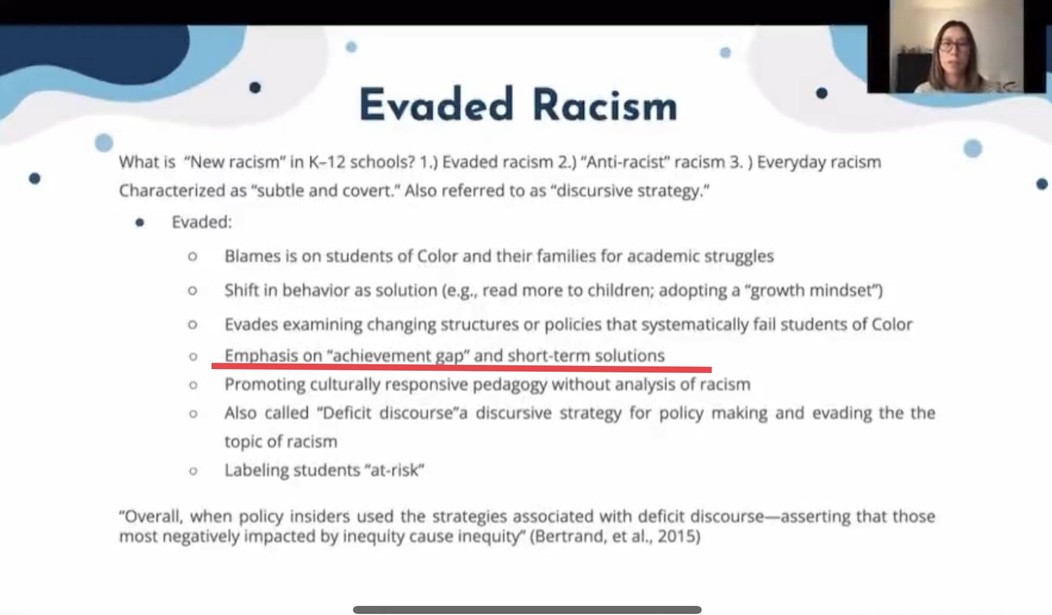Were you aware that trying to close the achievement gap between students of color and white students is an example of systemic racism?
Probably not. Most people think that getting all students up to speed on reading, writing, and arithmetic is a great idea. In fact, doing so might seem to be critical to closing not just the achievement gap, but equality in our society.
In this you are wrong. You are looking at the “problem” through the lens of white privilege.
Schools should NOT "encourage students to change their behavior or families to do more things that were like white families do, like reading to their children or adopting a growth mindset"
There's no way to overstate how destructive progressive neo-racism is for black children: https://t.co/vNC7WbQqNO
— Free Black Thought (@FreeBlckThought) October 1, 2023
You are likely aware that there are substantial and persistent differences in school achievement between white students and students of other races. Asian students tend to perform better than white students, and both Asian and white students tend to perform better in school than black and Hispanic students.
This fact is not in dispute, and there are a variety of reasons for this.
The explanation seems pretty straightforward: there is a difference in cultural attitudes, on average, between racial and class groups regarding education. Jews and Asians as groups tend to value educational attainment very highly, while on average black family groups value educational attainment less highly, or even disdain it as “acting white.”
Two other explanations are commonly tossed out there as explanations: genetic differences in IQ, or structural racism.
Obviously the first of these alternatives is generally rejected out of hand, both because the achievement gap is far less prominent among black immigrants than native-born American blacks, and the Hispanic achievement gap is largely driven by the challenges of having English as a second language for many students. It is also taboo to discuss such issues for obvious reasons. The American history of racism and in particular slavery makes discussion of racial differences in intelligence taboo and an easy excuse for not addressing the achievement gap.
Structural racism is an argument more difficult to dismiss. Obviously, blacks have been systematically discriminated against historically, and it isn’t difficult to argue that such discrimination persists. It may, in some cases. However, unless you want to argue that decades of efforts to close the achievement gap have all been a mask for an agenda to keep blacks uneducated, it behooves you to look at causes outside the classroom.
In fact, that is the argument for early childhood education programs aimed at disadvantaged students. It’s not hard to see that many minority students aren’t “school ready” when they enter the public school system, and that’s why so much effort and money has been poured into early childhood education programs.
Apparently, though, there is a movement to reject the idea that minority kids from disadvantaged backgrounds face cultural barriers to achievement. In fact, this is an example of “evaded racism.” The fact that white and Asian students get more intellectual stimulation before entering school than other kids isn’t an explanation for increased achievement–it is a problem and an example of racial animus on the part of privileged parents who want their kids to be prepared for school.
We should quit encouraging parents of minority students to read more to their kids and even to talk to them more. It isn’t controversial to note that black and Hispanic parents, on average, provide less intellectual stimulation to kids than white and Asian parents. The US Department of Education has a paper on this, and there is plenty of research to back this up:
The authors describe various parenting behaviors, such as nurturance, discipline, teaching, and language use, and explain how researchers measure them. They note racial and ethnic varia- tions in several behaviors. Most striking are differences in language use. Black and Hispanic mothers talk less with their young children than do white mothers and are less likely to read to them daily. They also note some differences in harshness.
When researchers measuring school readiness gaps control for parenting differences, the racial and ethnic gaps narrow by 25–50 percent. And it is possible to alter parenting behavior to im- prove readiness. The authors examine programs that serve poor families—and thus dispropor- tionately serve minority families—and find that home- and center-based programs with a par- enting component improve parental nurturance and discipline. Programs that target families with children with behavior problems improve parents’ skills in dealing with such children. And certain family literacy programs improve parents’ skills in talking with their children. Several interventions have significantly reduced gaps in the parenting behavior of black and white mothers.
Noting this is an example of “evaded racism”–blaming parents and culture for sub-par achievement, rather than pointing us toward an obvious solution to the achievement gap.
What crap.
Yet as you can see in the video above–a presentation given to K-12 teachers and researchers, this is where the anti-racist crowd is going. In fact, some argue that focusing on the achievement gap is itself racist and that encouraging parents to read to their kids and increase their stimulation at home is cultural colonialism–trying to turn minorities into whites.
Is it any wonder that student achievement is going backward in public schools? An ideology that explains academic failure as culturally appropriate rather than addressing it head-on is being propagated.
That is the message: achievement is “white.”








Join the conversation as a VIP Member